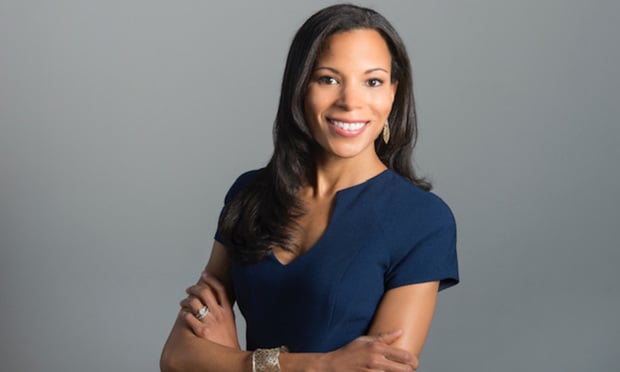Career Sponsors: Misunderstood, Yet Essential for Advancement
In order for a professional to ascend to the pinnacle rank of his or her chosen field—especially if that professional is a female or minority—there is another essential component that is less commonly understood and more determinative of the endpoint of one's occupational journey: a career sponsor.
December 07, 2018 at 12:37 PM
6 minute read
 Melanie Breaux, Larsson & Scheuritzel
Melanie Breaux, Larsson & Scheuritzel
There is little question that effective mentorships can profoundly benefit a professional's career, including a lawyer's career. Mentors provide mentees with advice and lessons not formally taught in school or on the job, constructive criticism and a safe space to vent about workplace concerns and frustrations. Yet, while mentorships are important, they are not enough. In order for a professional to ascend to the pinnacle rank of his or her chosen field—especially if that professional is a female or minority—there is another essential component that is less commonly understood and more determinative of the endpoint of one's occupational journey: a career sponsor.
Most lawyers have at least one mentor. Many of us have several, all valuable in their own rights for their own unique experiences and perspectives. Many law firms have formal mentorship programs and expressly encourage lawyers at all levels to participate either as mentors or mentees. In contrast, few lawyers understand what a career sponsor is, and fewer still truly grasp the difference between a mentor and a sponsor.
Understanding that difference is vital.
A mentor brings information to the mentee, while a sponsor acts on behalf of the more junior lawyer in a way that can directly advance that lawyer's career. In the context of a law firm, for instance, such actions can take the form of a more senior attorney providing opportunities for an associate to have direct client contact or a chance to lead an important all-hands conference call, giving coveted work assignments with high visibility and responsibility, or providing introductions to key contacts who can help with career advancement.
Sponsors pull you up to the next level, while mentors suggest how you might get there.
Take the following example: a group of senior lawyers in your company meets to discuss choosing an associate to be second or even first chair on a matter, a position that would represent a significant advance for you. Someone floats your name as a potential candidate. Another participant immediately lists several reasons why you might not yet be ready for the increased responsibility. And it is there, in that pivotal moment, that having a sponsor in the room to advocate for you is critical. Your mentor would provide you with feedback and advice after the meeting based on the leaders' comments: your sponsor would go to bat for you during the meeting, advocating, explaining why you are ready for the role and that you are in fact the best person for that position.
Your Sponsor Is Your Champion
A sponsor is almost always more senior to you (at least two levels above, much of the literature dictates). He must have the connections and clout to open doors for you, the ability to give you stretch assignments or tap you to run important meetings. In a word, a sponsor provides opportunity.
That is especially crucial for minority lawyers for it is precisely a lack of such opportunity in the workplace that presents one of the most formidable obstacles in a diverse lawyer's path. This is doubly true for minority women. Actress Viola Davis summarized it well during her 2017 Academy Award acceptance speech: “The only thing that separates women of color from anyone else is opportunity.” While companies are making progress, the statistics for diversity within top leadership positions of law firms and other organizations are dismal. A sponsor can be a powerful counterpunch to the obstacles and lack of opportunity that many minorities face.
Generally, women lag behind men when it comes to cultivating sponsor relationships. A seminal 2011 Harvard Business Review study entitled, “The Sponsor Effect: Breaking Through the Last Glass Ceiling”—which produced much of the nomenclature used in sponsorship literature today—found that women frequently confuse mentors and sponsors, and that even those who do perceive the difference tend to focus exclusively on cultivating mentors at the expense of attracting sponsors. The study attributes the hesitation on the part of women to pursue relationships with potential male sponsors in particular to trepidation about the appearance of impropriety.
Additionally, many women feel uncomfortable at the idea of intentionally targeting or connecting with someone for the primary purpose of career advancement or business development. Mentors can help identify potential sponsors, but it is ultimately up to the more junior lawyer to identify and attract a sponsor. Given the myriad opportunities that these relationships can provide, lawyers—including women and minorities—should work toward creating such relationships.
On the flip side, one who is in the position to act as a sponsor to a more junior attorney who deserves advancement should do so—the sponsor's work will validate his or her decision to advocate for that attorney. In addition, sponsors can derive a great deal of satisfaction from ensuring that opportunities are available to competent junior lawyers.
Most sponsor relationships develop over time. They are sometimes organic, and sometimes a result of intentional action on the part of the junior lawyer. While there is no one path to obtaining a sponsor, there are certain steps a lawyer can take to increase the likelihood of attracting one.
- Ensure that your work and reputation are stellar. When a sponsor speaks up on your behalf or taps you for plum assignments, he or she is risking credibility, which will suffer if you fail to deliver. Thus, a potential sponsor must be able to trust that you can handle the increased responsibility and excel at the tasks at hand. Earning a reputation for consistently completing assignments in a timely manner and to a level of quality that exceeds expectations is the best way to earn a potential sponsor's trust.
- Cultivate your personal brand. Get your name out there as an expert in your field or niche area of interest. Write client alerts, newsletters, articles or blogs. Request endorsements from clients who can speak highly of your work. Participate in speaking engagements. Teach continuing education seminars. All of this can help separate you from others in your firm and cause potential sponsors to take notice of you and give further reasons to forward your career.
The bottom line is that sponsorship can make the difference between a transcendent career and one that languishes in the middle. It is well worth the effort to find and effectively use a sponsor.
Melanie Breaux is a commercial real estate attorney with the law firm of Larsson & Scheuritzel. She writes and speaks about various topics, including diversity and workplace issues, and enjoys serving on boards focused on culture and the arts.
This content has been archived. It is available through our partners, LexisNexis® and Bloomberg Law.
To view this content, please continue to their sites.
Not a Lexis Subscriber?
Subscribe Now
Not a Bloomberg Law Subscriber?
Subscribe Now
NOT FOR REPRINT
© 2025 ALM Global, LLC, All Rights Reserved. Request academic re-use from www.copyright.com. All other uses, submit a request to [email protected]. For more information visit Asset & Logo Licensing.
You Might Like
View All
Trump's Return to the White House: The Legal Industry Reacts

Law Firm-Legal Department Relationships Benefit From 'Standard Terms of Engagement'
4 minute readTrending Stories
- 1What’s at Stake in Supreme Court Case Over Religious Charter School?
- 2People in the News—Jan. 30, 2025—Rubin Glickman, Goldberg Segalla
- 3Georgia Republicans Push to Limit Lawsuits. But Would That Keep Insurance Rates From Rising?
- 4Trending Issues in Florida Construction Law That Attorneys Need to Be Aware Of
- 5The Importance of Judicial Elections
Who Got The Work
J. Brugh Lower of Gibbons has entered an appearance for industrial equipment supplier Devco Corporation in a pending trademark infringement lawsuit. The suit, accusing the defendant of selling knock-off Graco products, was filed Dec. 18 in New Jersey District Court by Rivkin Radler on behalf of Graco Inc. and Graco Minnesota. The case, assigned to U.S. District Judge Zahid N. Quraishi, is 3:24-cv-11294, Graco Inc. et al v. Devco Corporation.
Who Got The Work
Rebecca Maller-Stein and Kent A. Yalowitz of Arnold & Porter Kaye Scholer have entered their appearances for Hanaco Venture Capital and its executives, Lior Prosor and David Frankel, in a pending securities lawsuit. The action, filed on Dec. 24 in New York Southern District Court by Zell, Aron & Co. on behalf of Goldeneye Advisors, accuses the defendants of negligently and fraudulently managing the plaintiff's $1 million investment. The case, assigned to U.S. District Judge Vernon S. Broderick, is 1:24-cv-09918, Goldeneye Advisors, LLC v. Hanaco Venture Capital, Ltd. et al.
Who Got The Work
Attorneys from A&O Shearman has stepped in as defense counsel for Toronto-Dominion Bank and other defendants in a pending securities class action. The suit, filed Dec. 11 in New York Southern District Court by Bleichmar Fonti & Auld, accuses the defendants of concealing the bank's 'pervasive' deficiencies in regards to its compliance with the Bank Secrecy Act and the quality of its anti-money laundering controls. The case, assigned to U.S. District Judge Arun Subramanian, is 1:24-cv-09445, Gonzalez v. The Toronto-Dominion Bank et al.
Who Got The Work
Crown Castle International, a Pennsylvania company providing shared communications infrastructure, has turned to Luke D. Wolf of Gordon Rees Scully Mansukhani to fend off a pending breach-of-contract lawsuit. The court action, filed Nov. 25 in Michigan Eastern District Court by Hooper Hathaway PC on behalf of The Town Residences LLC, accuses Crown Castle of failing to transfer approximately $30,000 in utility payments from T-Mobile in breach of a roof-top lease and assignment agreement. The case, assigned to U.S. District Judge Susan K. Declercq, is 2:24-cv-13131, The Town Residences LLC v. T-Mobile US, Inc. et al.
Who Got The Work
Wilfred P. Coronato and Daniel M. Schwartz of McCarter & English have stepped in as defense counsel to Electrolux Home Products Inc. in a pending product liability lawsuit. The court action, filed Nov. 26 in New York Eastern District Court by Poulos Lopiccolo PC and Nagel Rice LLP on behalf of David Stern, alleges that the defendant's refrigerators’ drawers and shelving repeatedly break and fall apart within months after purchase. The case, assigned to U.S. District Judge Joan M. Azrack, is 2:24-cv-08204, Stern v. Electrolux Home Products, Inc.
Featured Firms
Law Offices of Gary Martin Hays & Associates, P.C.
(470) 294-1674
Law Offices of Mark E. Salomone
(857) 444-6468
Smith & Hassler
(713) 739-1250







